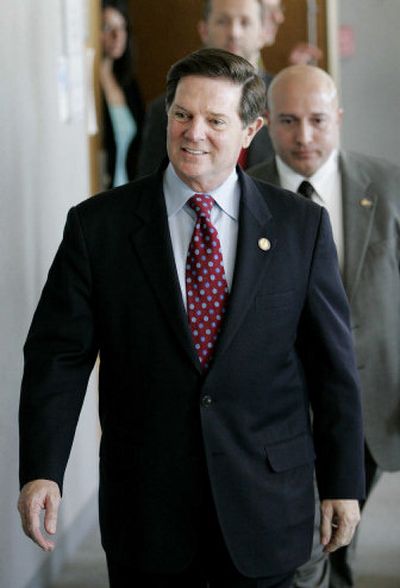DeLay, Abramoff tied through financial web

WASHINGTON – The U.S. Family Network, a public advocacy group that operated in the 1990s with close ties to Rep. Tom DeLay, R-Texas, and claimed to be a nationwide grass-roots organization, was funded almost entirely by corporations linked to embattled lobbyist Jack Abramoff, according to tax records and former associates of the group.
During its five-year existence, the U.S. Family Network raised $2.5 million but kept its donor list secret. The list, obtained by the Washington Post, shows that $1 million of its revenue came in a single 1998 check from a now-defunct London law firm whose former partners will not identify the money’s origins.
Two former associates of Edwin Buckham, the congressman’s former chief of staff and the organizer of the U.S. Family Network, said Buckham told them the funds came from Russian oil and gas executives. Abramoff had been working closely with two such Russian energy executives on their Washington agenda, and the lobbyist and Buckham had helped organize a 1997 Moscow visit by DeLay.
The former president of the U.S. Family Network said Buckham told him that Russians contributed $1 million to the group in 1998 specifically to influence DeLay’s vote on legislation the International Monetary Fund needed to finance a bailout of the collapsing Russian economy.
A spokesman for DeLay, who is fighting in a Texas state court unrelated charges of illegal fund raising, denied that the contributions influenced the former House majority leader’s political activities. The Russian energy executives who worked with Abramoff on Friday denied knowing anything about the million-dollar London transaction described in tax documents.
Whatever the real motive for the contribution of $1 million – a sum not prohibited by law but extraordinary for a small, nonprofit group – the steady stream of corporate payments detailed on the donor list makes it clear that Abramoff’s long-standing alliance with DeLay was sealed by a much more extensive web of financial ties than previously known.
Records and interviews also illuminate the mixture of influence and illusion that surrounded the U.S. Family Network. Despite the group’s avowed purpose, records show it did little to promote conservative ideas through grass-roots advocacy. The money it raised came from businesses with no demonstrated interest in the conservative “moral fitness” agenda that was the group’s professed aim.
In addition to the million-dollar payment involving the London law firm, for example, half a million dollars was donated to the U.S. Family Network by the owners of textile companies in the Mariana Islands in the Pacific, according to the tax records. The textile owners – with Abramoff’s help – solicited and received DeLay’s public commitment to block legislation that would boost their labor costs, according to Abramoff associates, one of the owners and a DeLay speech in 1997.
A quarter of a million dollars was donated over two years by the Mississippi Band of Choctaw Indians, Abramoff’s largest lobbying client, which counted DeLay as an ally in fighting legislation allowing the taxation of its gambling revenue.
The records, other documents and interviews call into question the very purpose of the U.S. Family Network, which functioned mostly by collecting funds from domestic and foreign businesses whose interests coincided with DeLay’s activities while he was serving as House majority whip from 1995 to 2002, and as majority leader from 2002 until the end of September.
After the group was formed in 1996, its director told the Internal Revenue Service that its goal was to advocate policies favorable for “economic growth and prosperity, social improvement, moral fitness, and the general well-being of the United States.” DeLay, in a 1999 fund-raising letter, called the group “a powerful nationwide organization dedicated to restoring our government to citizen control” by mobilizing grass-roots citizen support.
But the records show that the tiny U.S. Family Network, which never had more than one full-time staff member, spent comparatively little money on public advocacy or education projects. Although established as a nonprofit organization, it paid hundreds of thousands of dollars in fees to Buckham and his lobbying firm, Alexander Strategy Group.
There is no evidence DeLay received a direct financial benefit, but Buckham’s firm employed DeLay’s wife, Christine, and paid her a salary of at least $3,200 each month for three of the years the group existed. Richard Cullen, DeLay’s attorney, has said that the pay was compensation for lists Christine DeLay supplied to Buckham of lawmakers’ favorite charities, and that it was appropriate under House rules and election law.